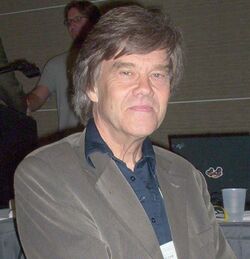Biography:Victor Snieckus
Victor Snieckus | |
|---|---|
 Snieckus at an American Chemical Society meeting in Boston in 2007 | |
| Born | August 1, 1937 Kaunas, Lithuania |
| Died | December 18, 2020 (aged 83) |
| Known for | Directed ortho metalation reactions |
| Scientific career | |
| Fields | Organic chemistry, synthetic chemistry |
| Institutions | University of Waterloo, Queen's University at Kingston |
Victor Snieckus (August 1, 1937 - December 18, 2020[2]) was a synthetic organic chemist and professor emeritus at Queen's University in Kingston, Ontario. He was known for his influential research on directed ortho metalation.[2][3][4]
Early life and education
Snieckus was born in Kaunas, Lithuania in 1937. His family lived in Germany during World War II and in 1948 immigrated to Alberta, Canada. Snieckus received his bachelor's degree in chemistry from University of Alberta in 1959, his master's degree from University of California, Berkeley in 1961, and his PhD from the University of Oregon in 1965 under the supervision of Virgil Boekelheide.[4] He spent a year as a postdoctoral scholar at the National Research Council of Canada.[2][3]
Academic career
In 1967 Snieckus joined the faculty of the University of Waterloo as an assistant professor, becoming an associate professor in 1971 and a full professor in 1979.[2][3] He assumed the Monsanto/NRC research chair in 1992.[3][5]
Snieckus relocated to Queen's University in 1998, where he assumed the Bader Chair of Chemistry. He retired and became professor emeritus in 2009.[2] He founded a company, Snieckus Innovations, the same year, originally funded by Alfred Bader.[6] Throughout his career Snieckus consulted for the pharmaceutical and agricultural industries.[2][3]
Among other awards, Snieckus became a Fellow of the Royal Society of Canada in 1993, a Fellow of the Lithuanian Academy of Sciences in 1999,[4] and a Fellow of the American Chemical Society in 2009.[2][4]
Snieckus served as an editor for a variety of academic journals, was the president of the International Society of Heterocyclic Chemistry in 1985, and chaired the American Chemical Society's Organic Division in 1989–90.[4] He co-organized an academic conference series, Balticum Organicum Syntheticum, a chemistry conference held in the Baltic States.[2][7]
Research
Snieckus' research interests in organic synthesis focused on metalation and particularly lithiation. He is best known for his work on the directed ortho metalation family of reactions.[2][3][8] His work has had practical applications in both academic and industrial settings,[4] particularly in the industrial-scale synthesis of pharmaceuticals and in an agricultural antifungal.[5][6]
References
- ↑ "Victor Snieckus Obituary (1937 - 2020) - Kingston, ON - Torstar". https://www.legacy.com/obituaries/torstar/obituary.aspx?n=victor-snieckus&pid=197533666&fhid=40081.
- ↑ 2.0 2.1 2.2 2.3 2.4 2.5 2.6 2.7 2.8 "Victor Snieckus (1937 – 2020)". Wiley-VCH GmbH. 21 December 2020. https://www.chemistryviews.org/details/ezine/11282662/Victor_Snieckus_1937__2020.html.
- ↑ 3.0 3.1 3.2 3.3 3.4 3.5 "Queen's remembers Professor Emeritus Victor Snieckus". Queen's University. 22 December 2020. https://www.queensu.ca/gazette/stories/queen-s-remembers-professor-emeritus-victor-snieckus.
- ↑ 4.0 4.1 4.2 4.3 4.4 4.5 Green, James R (1 November 2001). "Biography of Professor Victor Snieckus". Canadian Journal of Chemistry 79 (11): v–vii. doi:10.1139/cjc7911dedicat.
- ↑ 5.0 5.1 Gunn, Andrea (2019). "The magic of chemistry". Queen's Alumni Review (3). https://www.queensu.ca/gazette/alumnireview/stories/magic-chemistry.
- ↑ 6.0 6.1 Lougheed, Tim (November–December 2016). "A synthesizing life". Canadian Chemical News (Chemical Institute of Canada). https://www.cheminst.ca/magazine/article/a-synthesizing-life/.
- ↑ "Organizers". https://boschem.eu/organizers/.
- ↑ Snieckus, Victor (September 1990). "Directed ortho metalation. Tertiary amide and O-carbamate directors in synthetic strategies for polysubstituted aromatics". Chemical Reviews 90 (6): 879–933. doi:10.1021/cr00104a001.
 |

